EPA wants you to blow up your car
#21
Boost Pope


iTrader: (8)
Join Date: Sep 2005
Location: Chicago. (The less-murder part.)
Posts: 33,020
Total Cats: 6,588
Without passing any judgement whatsoever on the economy or efficacy at reducing pollution of the use of plant-derived ethanol as a motor vehicle fuel, my thoughts keep coming back to one simple fact:
On the subject of whether or not we should, by governmental mandate, decrease the amount of petroleum used to make pump gas, the sole source of data cited by the report in post #1 is a lobbying agency whose mandate involves fighting against climate-control legislation and promoting the use of petroleum.
I literally cannot grasp how the author of that article couldn't have at least paid his readers the courtesy of attempting to obscure the source of his data.
On the subject of whether or not we should, by governmental mandate, decrease the amount of petroleum used to make pump gas, the sole source of data cited by the report in post #1 is a lobbying agency whose mandate involves fighting against climate-control legislation and promoting the use of petroleum.
I literally cannot grasp how the author of that article couldn't have at least paid his readers the courtesy of attempting to obscure the source of his data.
#22
I'm lucky. There are quite a few E0 Gas stations around here. Most don't even cost more than the e10 crap.
I wonder how much gas would cost if the ethanol industry wasn't so heavily subsidized. I read an article not too long ago about the affects of the ethanol industry on farming. It seems that many farmers are raising less livestock and growing less crops for food in order to utilize more space for corn because it's becoming more profitable to the farmers to do so. (Thanks to the subsidies anyway) That in turn causes prices to be higher on produce and meats. Good one government. It would be an interesting day if the government stops subsidizing ethanol.
On the subject of the possibility of an e15 mandate..... I think I'll look into whale oil as an alternative. Or baby seal tears. One of the two. Government stupidity FTL
I wonder how much gas would cost if the ethanol industry wasn't so heavily subsidized. I read an article not too long ago about the affects of the ethanol industry on farming. It seems that many farmers are raising less livestock and growing less crops for food in order to utilize more space for corn because it's becoming more profitable to the farmers to do so. (Thanks to the subsidies anyway) That in turn causes prices to be higher on produce and meats. Good one government. It would be an interesting day if the government stops subsidizing ethanol.
On the subject of the possibility of an e15 mandate..... I think I'll look into whale oil as an alternative. Or baby seal tears. One of the two. Government stupidity FTL
#23
Boost Czar


Thread Starter
iTrader: (62)
Join Date: May 2005
Location: Chantilly, VA
Posts: 79,493
Total Cats: 4,080
I think we shoudl all start a lobby based solely on sarcasm and getting ridiculous laws passed just for the irony.
#24
Tour de Franzia

iTrader: (6)
Join Date: Jun 2006
Location: Republic of Dallas
Posts: 29,085
Total Cats: 375
Kind of like the powered wind turbines at the UNT stadium? UNT wanted to appear "environmentally friendly" so the installed wind turbines. Then, they had to feed them electricity to get them spinning during football games because there isn't a lot of wind here in north Texas.
#26
Kind of like the powered wind turbines at the UNT stadium? UNT wanted to appear "environmentally friendly" so the installed wind turbines. Then, they had to feed them electricity to get them spinning during football games because there isn't a lot of wind here in north Texas.
#29
Boost Pope


iTrader: (8)
Join Date: Sep 2005
Location: Chicago. (The less-murder part.)
Posts: 33,020
Total Cats: 6,588
According to the Energy Information Administration (EIA), the global average price of a barrel of crude oil jumped from $56.64 to $99.67 between 2005 and 2008, an increase of 76%, while the global demand for oil increased by only 1% -- from 84.58 million barrels per day to 85.46MBD. Tight global supplies and supply chains had accelerated the price rise over small volume increases, as producers hit the limit of what they could produce and deliver.
During the same period, the Renewable Fuels Association (RFA) reports that domestic ethanol production increased 130% (from 3.9 billion gallons per year to 9.0 billion gallons per year) reaching 373,600 barrels of oil per day on an equivalent Btu basis in 2008.
Significantly, this increase in biofuel production was the dominant contributor to U.S. imports of foreign oil falling over that same period, during a period of robust economic growth and falling U.S. oil production. Certainly, anyone concerned about domestic energy security would find that statistic encouraging.
Economically speaking, without ethanol production, the U.S. would have required an additional 1.3% of its total oil consumed, predominantly from abroad, or 0.34% of the global oil supply. Considering a price increase of $43/bbl from the previous 1% rise in world demand, simple but conservative extrapolation suggests that the additional one-third of a percent of the supply that biofuels supplanted would have increased global oil prices by an additional $15/bbl. This equates to a nearly $120 billion of annual savings for American oil consumers, based on a total of 8 billion barrels consumed annually. And this is to say nothing about the jobs that biofuels created, the tax revenue generated, and biofuels' contribution to national GDP as opposed to.
In light of the diminishing supplies of inexpensively accessible oil, it seems likely that biofuels' role in directly replacing petroleum and softening the impact of diminishing crude supplies will become paramount in the coming years, especially as 2.5 billion people in "Chindia" continue to undergo their industrial revolutions, 6 billion people on the planet catch up to the personal mobility mass consumer lifestyles that 1 billion of us take for granted, and we approach the peak of easily accessible conventional oil supplies.
The forthcoming oil shocks will be partially mitigated by higher ethanol supplies -- and for that, we have reason to thank the corn ethanol industry. Yet, the economist in me cannot help but wonder about the opportunity costs that we have incurred over the last several decades. Specifically, by not investing the tens of billions of dollars necessary to scale up second- and third-generation biofuels that could displace 100% of our petroleum consumption with non-food based feedstocks, rather than the investments that were made in first-generation biofuels that have led us to be subservient to an Agricultural Industrial Complex that dictates our national biofuels policy.
During the same period, the Renewable Fuels Association (RFA) reports that domestic ethanol production increased 130% (from 3.9 billion gallons per year to 9.0 billion gallons per year) reaching 373,600 barrels of oil per day on an equivalent Btu basis in 2008.
Significantly, this increase in biofuel production was the dominant contributor to U.S. imports of foreign oil falling over that same period, during a period of robust economic growth and falling U.S. oil production. Certainly, anyone concerned about domestic energy security would find that statistic encouraging.
Economically speaking, without ethanol production, the U.S. would have required an additional 1.3% of its total oil consumed, predominantly from abroad, or 0.34% of the global oil supply. Considering a price increase of $43/bbl from the previous 1% rise in world demand, simple but conservative extrapolation suggests that the additional one-third of a percent of the supply that biofuels supplanted would have increased global oil prices by an additional $15/bbl. This equates to a nearly $120 billion of annual savings for American oil consumers, based on a total of 8 billion barrels consumed annually. And this is to say nothing about the jobs that biofuels created, the tax revenue generated, and biofuels' contribution to national GDP as opposed to.
In light of the diminishing supplies of inexpensively accessible oil, it seems likely that biofuels' role in directly replacing petroleum and softening the impact of diminishing crude supplies will become paramount in the coming years, especially as 2.5 billion people in "Chindia" continue to undergo their industrial revolutions, 6 billion people on the planet catch up to the personal mobility mass consumer lifestyles that 1 billion of us take for granted, and we approach the peak of easily accessible conventional oil supplies.
The forthcoming oil shocks will be partially mitigated by higher ethanol supplies -- and for that, we have reason to thank the corn ethanol industry. Yet, the economist in me cannot help but wonder about the opportunity costs that we have incurred over the last several decades. Specifically, by not investing the tens of billions of dollars necessary to scale up second- and third-generation biofuels that could displace 100% of our petroleum consumption with non-food based feedstocks, rather than the investments that were made in first-generation biofuels that have led us to be subservient to an Agricultural Industrial Complex that dictates our national biofuels policy.
#31
Boost Pope


iTrader: (8)
Join Date: Sep 2005
Location: Chicago. (The less-murder part.)
Posts: 33,020
Total Cats: 6,588
A lot of seemingly scientific arguments exist to oppose the use of ethanol as fuel. One of the most common is that "it takes more energy to produce a gallon of ethanol than the energy which can be extracted from it."
This, of course is true. But it is not a complete answer.
In order to make a reasonable analysis, it's necessary to do two things. The first is to compare the energy lifecycle of ethanol with its alternative (gasoline), and the second is to analyze the sources of that energy.
This chart shows the total amount of energy in BTU required to produce 1 BTU worth of fuel. Green represents the BTU which actually winds up in the fuel, yellow represents the BTU used in the production of the fuel. The last column, "Cell. EToH" represents "cellulistic ethanol", which is fuel made from corn stover, rice and wheat straw, and other products which are either "leftovers" from unrelated agricultural production or crops such as sawgrass which grow naturally in abundance and require no cultivation or fertilization.
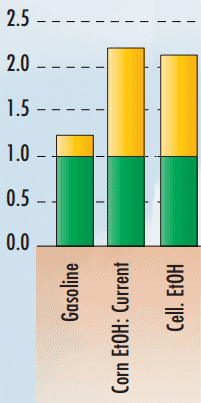
Pretty bleak, huh? Gasoline requires only about 20% more energy to produce than its yield, as compared to ethanol's nearly 120% overhead.
But there's a catch- quite a lot of that overhead comes to us for free, in the form of Mr. Sun! Yes, most of the analysis which you read that reach the aforementioned conclusion are taking into account the solar energy that went into growing the plant in the first place, relying on the assumption that the reader will not be smart enough to ask the obvious question. So what happens when we strip that off and focus on just the amount of fossil-fuel-derived energy consumed?
We get this:
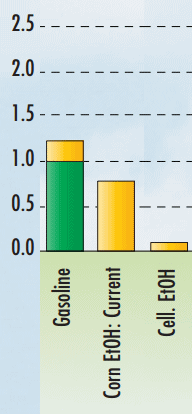
Things are looking quite a bit better now. The amount of fossil energy required to produce one BTU of corn-based ethanol is noticeably less than the potential energy content of the fuel, and for cellulistic ethanol, it's almost disappearing off the scale (remember, it's a waste product- no specific cultivation required.) By comparison, gasoline's total energy picture hasn't budged.
But what happens when you dig even deeper, and start separating out the different kinds of fossil-fuel energy? After all, some fossil fuels (like petroleum) are constantly growing more expensive and more scare in the global market, while others, such as coal and natural gas, are fairly cheap domestic products.
Specifically, let's look at just the energy input which is derived from petroleum:
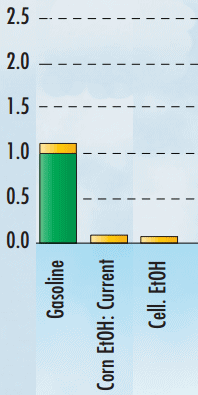
WTF?
Well, as it turns out, a lot of the energy that goes into producing ethanol comes in the form of electricity. And where do we get most of our electricity from in the US? (Hint: not petroleum.) Wanna know how to reduce that number all the way to zero? Build nukes. (And also plugin electric farm tractors. But that's a fairly trivial argument.).
This, of course is true. But it is not a complete answer.
In order to make a reasonable analysis, it's necessary to do two things. The first is to compare the energy lifecycle of ethanol with its alternative (gasoline), and the second is to analyze the sources of that energy.
This chart shows the total amount of energy in BTU required to produce 1 BTU worth of fuel. Green represents the BTU which actually winds up in the fuel, yellow represents the BTU used in the production of the fuel. The last column, "Cell. EToH" represents "cellulistic ethanol", which is fuel made from corn stover, rice and wheat straw, and other products which are either "leftovers" from unrelated agricultural production or crops such as sawgrass which grow naturally in abundance and require no cultivation or fertilization.

Pretty bleak, huh? Gasoline requires only about 20% more energy to produce than its yield, as compared to ethanol's nearly 120% overhead.
But there's a catch- quite a lot of that overhead comes to us for free, in the form of Mr. Sun! Yes, most of the analysis which you read that reach the aforementioned conclusion are taking into account the solar energy that went into growing the plant in the first place, relying on the assumption that the reader will not be smart enough to ask the obvious question. So what happens when we strip that off and focus on just the amount of fossil-fuel-derived energy consumed?
We get this:

Things are looking quite a bit better now. The amount of fossil energy required to produce one BTU of corn-based ethanol is noticeably less than the potential energy content of the fuel, and for cellulistic ethanol, it's almost disappearing off the scale (remember, it's a waste product- no specific cultivation required.) By comparison, gasoline's total energy picture hasn't budged.
But what happens when you dig even deeper, and start separating out the different kinds of fossil-fuel energy? After all, some fossil fuels (like petroleum) are constantly growing more expensive and more scare in the global market, while others, such as coal and natural gas, are fairly cheap domestic products.
Specifically, let's look at just the energy input which is derived from petroleum:

WTF?
Well, as it turns out, a lot of the energy that goes into producing ethanol comes in the form of electricity. And where do we get most of our electricity from in the US? (Hint: not petroleum.) Wanna know how to reduce that number all the way to zero? Build nukes. (And also plugin electric farm tractors. But that's a fairly trivial argument.).
Last edited by Joe Perez; 02-03-2013 at 05:18 PM.
#33
Boost Czar


Thread Starter
iTrader: (62)
Join Date: May 2005
Location: Chantilly, VA
Posts: 79,493
Total Cats: 4,080
what about the fact you cant pipeline ethanol and all the additional costs associated with the transportation of ethanol (diesel)? also the decreased output the e10 produces so the increased need to fill up your tank?
#34
Boost Pope


iTrader: (8)
Join Date: Sep 2005
Location: Chicago. (The less-murder part.)
Posts: 33,020
Total Cats: 6,588
For the same reason that you can't pour gravy on top of mashed potatoes.
Which is to say that you can. In Brazil, where ethanol has been a common automotive fuel for years, several pipelines exist. Here's a report on a current proposal to build a 1,800 mile ethanol pipeline in the US, linking the major ethanol distillation plants of the mid-west to the fuel-hungry New England states:
Building the world's longest ethanol pipeline - Mar. 12, 2010
If you meant that Ethanol cannot be transported in the same pipelines presently used to convey petroleum, that of course is partially true. There'd be some rework required, and the industry would also have to adopt the practice of inserting pigs* into the line to separate ethanol from non-ethanol products, whereas current practice is just to shove one product in after another (gasoline directly after diesel, for instance), with the small percentage of commingled product on the far end being used for non-critical applications, such as a dilutant for heating oil.
Milk and sexual lubricant also cannot be transported through existing petroleum pipelines, and yet those commodities do not seem to face hysterical opposition.
* = a "pig" is a torpedo-like device which can be propelled through a pipeline by the pressure of the product surrounding it. They are used for maintenance and inspection of the lines, and in more modern pipelines, are also used to prevent co-mingling of product. Read more about the technology here: http://en.wikipedia.org/wiki/Pigging
The same burdened costs existed for gasoline, kerosene, etc., prior to the implementation of dedicated petroleum pipelines. Since the proposed ethanol pipeline makes it all the way to the Atlantic ports, it will also allow for refined ethanol to be transported by ship to the southeastern Atlantic and Gulf ports.
Out here on the west coast, we'll have to continue to be content with rail transport for the time being.
Uhm, I guess you'll just have to fill up your tank more frequently. I know it's a major sacrifice to have to pull into a gas station and waste 10 to 15 minutes of your life an extra couple of times per month, but you're strong- I know you can do it. 
Which is to say that you can. In Brazil, where ethanol has been a common automotive fuel for years, several pipelines exist. Here's a report on a current proposal to build a 1,800 mile ethanol pipeline in the US, linking the major ethanol distillation plants of the mid-west to the fuel-hungry New England states:
Building the world's longest ethanol pipeline - Mar. 12, 2010
If you meant that Ethanol cannot be transported in the same pipelines presently used to convey petroleum, that of course is partially true. There'd be some rework required, and the industry would also have to adopt the practice of inserting pigs* into the line to separate ethanol from non-ethanol products, whereas current practice is just to shove one product in after another (gasoline directly after diesel, for instance), with the small percentage of commingled product on the far end being used for non-critical applications, such as a dilutant for heating oil.
Milk and sexual lubricant also cannot be transported through existing petroleum pipelines, and yet those commodities do not seem to face hysterical opposition.
* = a "pig" is a torpedo-like device which can be propelled through a pipeline by the pressure of the product surrounding it. They are used for maintenance and inspection of the lines, and in more modern pipelines, are also used to prevent co-mingling of product. Read more about the technology here: http://en.wikipedia.org/wiki/Pigging
and all the additional costs associated with the transportation of ethanol (diesel)?
Out here on the west coast, we'll have to continue to be content with rail transport for the time being.
also the decreased output the e10 produces so the increased need to fill up your tank?

Last edited by Joe Perez; 02-03-2013 at 05:33 PM.
#36
To the rest of you screaming tree monkeys, protesting energy and environmental consciousness is like protesting good hygiene. You're more than entitled to protest any specific method of promoting those things, like laws that are stupid, but protesting the things themselves just makes you look stupid.
#37
As for Joe's posts, one wonders the source of the data. There are, after all, lies, damn lies and statistics. Joe rightfully points to the source of OP's data as being suspect, but I wonder how much better Joe's data is? What were the calculation methods, what were the assumptions.
I really don't believe anything anymore. My main environmental problem right now is that my brand new longblock is leaking oil and causing an environmental catastrophe on my garage floor.
#38
Boost Pope


iTrader: (8)
Join Date: Sep 2005
Location: Chicago. (The less-murder part.)
Posts: 33,020
Total Cats: 6,588
That's a fair critique. I've been far less fastidious than usual about citing sources, largely because I have been making a concerted attempt to formulate my own arguments, rather than copy-pasting the viewpoints of others (goes back to prior discussions with JasonC involving economic policy and central banking.)
The graphs which I used earlier were taken from a paper entitled "The complete energy lifecycle" written by Dr. Michael **** of the Argonne National Laboratory, and published by the US Dept. of Energy. Some supporting data was taken from the paper "Overview of biomass pretreatment for cellulosic ethanol production, published in the International Journal of Agricultural and Biological Engineering, as well as from an article entitled "Intoxicated on Independence: Is Domestically Produced Ethanol Worth the Cost?" published by Scientific American.
I did cite my sources in the first half of the most recent post, with the exception of the commentary on milk and sexual lubricant. I found no data which specifically disproved that these materials could be transported by pipeline, however they were not among many articles which I read on pipelining as a whole, which discussed pipeline transportation of water, petrochemicals, ammonia, beer, and a few other common products. Given the incidental nature of the comment, and the extreme improbability that milk and butt-lube would be compatible with a petroleum-optimized pipeline, I assume that we can handwave over that.
The second half, beginning with "The same burdened costs existed for gasoline..." is fairly common historical knowledge. I'm sure I can dig up some citations if you don't believe me.
The third half, where I posit that the reduced energy density of ethanol would cause Scott to "waste 10 to 15 minutes of your life an extra couple of times per month" is not supported by published data. This is purely conjecture on my part, based upon my own experiences vis-a-vis the putting of gasoline into cars.
The graphs which I used earlier were taken from a paper entitled "The complete energy lifecycle" written by Dr. Michael **** of the Argonne National Laboratory, and published by the US Dept. of Energy. Some supporting data was taken from the paper "Overview of biomass pretreatment for cellulosic ethanol production, published in the International Journal of Agricultural and Biological Engineering, as well as from an article entitled "Intoxicated on Independence: Is Domestically Produced Ethanol Worth the Cost?" published by Scientific American.
I did cite my sources in the first half of the most recent post, with the exception of the commentary on milk and sexual lubricant. I found no data which specifically disproved that these materials could be transported by pipeline, however they were not among many articles which I read on pipelining as a whole, which discussed pipeline transportation of water, petrochemicals, ammonia, beer, and a few other common products. Given the incidental nature of the comment, and the extreme improbability that milk and butt-lube would be compatible with a petroleum-optimized pipeline, I assume that we can handwave over that.
The second half, beginning with "The same burdened costs existed for gasoline..." is fairly common historical knowledge. I'm sure I can dig up some citations if you don't believe me.
The third half, where I posit that the reduced energy density of ethanol would cause Scott to "waste 10 to 15 minutes of your life an extra couple of times per month" is not supported by published data. This is purely conjecture on my part, based upon my own experiences vis-a-vis the putting of gasoline into cars.
#39
Boost Pope


iTrader: (8)
Join Date: Sep 2005
Location: Chicago. (The less-murder part.)
Posts: 33,020
Total Cats: 6,588
So, moving on.
We have seen that the use of ethanol as compared to gasoline requires less fossil-fuel energy input per unit of deliverable energy across the entire lifecycle. At present, the savings is approximately 60% (0.74 fossil BTU per 1 deliverable BTU, vs. 1.23 fossil BTU per 1 deliverable BTU.)
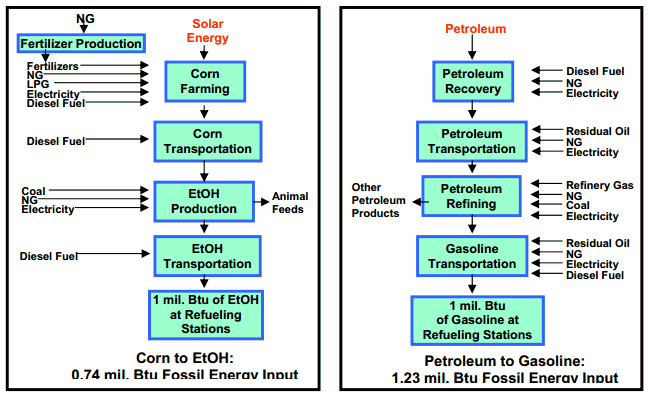
(source)
Furthermore, these figures assume 100% corn feedstock, using present-day refining and transportation technology. Looking back at 60 years of historical data, the productivity of corn farmers has grown dramatically. In 1950, average corn yields were roughly 38 bushels per acre, while today, an average corn yield is slightly over 150 bushels per acre. And more importantly, this has followed an almost rock-steady trendline which would support the conclusion that productivity will continue to grow in the future.
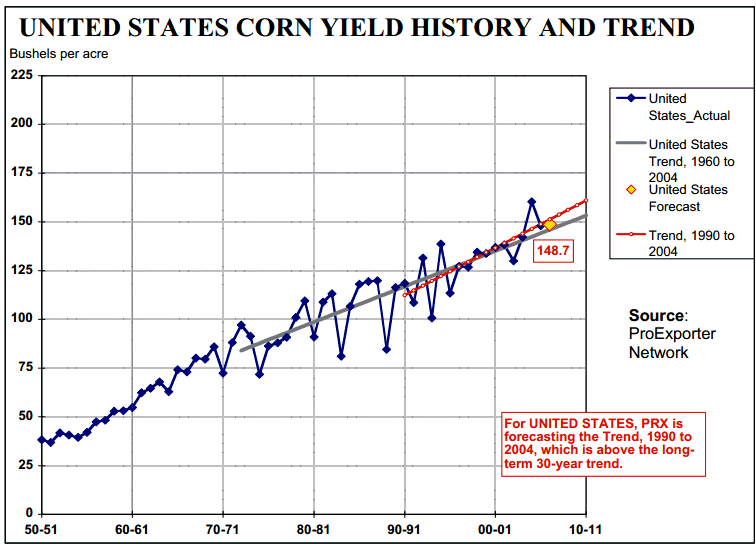
(source)
And improved crop yields aren't the only benny in the equation- ethanol refiners and seed companies have also been doing their part. Improvements in distillation efficiency and the development of high-starch hybrid seeds have yielded a 20% improvement in ethanol conversion (gallons per bushel) just in the past eight years, above and beyond improvement in crop yield.
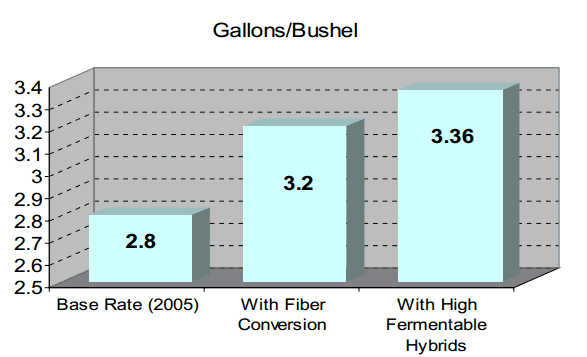
(source)
Add to this the fact that pipelining will decrease our reliance upon diesel fuel for transportation of ethanol, and that much of the fossil energy input into the distillation process (typically coal) is already being replaced with NatGas for power generation (and will, in the future, be further supplemented with fossil-free generation) and the efficiency advantage of ethanol will only continue to grow.
But what about its impact on food prices?
Well, for starters, only about 1% of US corn production is suitable for direct human consumption, and an additional 5% of corn production is used for the production of food additives, sweeteners, etc. The rate of corn consumption in the US has remained flat for decades. Furthermore, the price of raw foodstocks represents only about 15-20% of the retail price of food. The corn in your box of corn flakes costs about a nickel. Labor accounts for close to 40% of the cost of food, with an additional 20-25% going into packaging, transportation, energy, profit, etc. Energy prices have roughly twice the impact on food costs than fluctuations in the price of the actual raw materials of food do.
What about the remaining 94% of corn production? That is used for things like making animal feed. And here's the kicker- you can still use the corn for animal feed after you've made ethanol from it. In fact, this practice has been around for at least a century. When corn is used for the production of alcoholic beverages, only the starch portion of the kernel is consumed. The remaining grain is rich in protein and fat, and is sold to livestock farmers as a product called "distiller's grain." Since the production of ethanol as fuel is essentially identical to that of ethanol for whiskey, the "spent" grain from the process is still useful as a feed stock.
All in all, the impact of ethanol production on food supply and food price is almost negligible- the two uses are not contradictory.
(source and source and source and source)
So, is it bad for the environment?
Not according to any definition of the word that I'm familiar with.
Right off the bat, FFV vehicles achieve a 22% overall reduction in greenhouse gasses when run on E85 from DM corn feedstock, and a 64% reduction when looking at cellulosic ethanol.
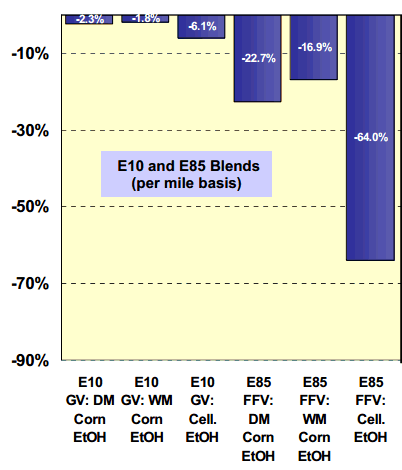
Moreover, particulate-matter emissions (a leading direct cause of respiratory ailment and death in humans) decrease by 50%.
Furthermore, in 2011, ethanol use reduced reduced CO2-equivalent greenhouse gas emissions by 25.3 million metric tons. That's equal to the emissions of 4 million cars- equivalent to getting rid of nearly every single vehicle in the entire state of Alabama. And mind you, this is real data, based mostly on E10. Going to E85, you can easily extrapolate the data upwards to see what a truly radical shift this is.
(source and source and source)
Ethanol is a scam: It's subsidized by the government.
Well, it WAS subsidized by the government.
The federal tax credit for ethanol intended for gasoline blending, first instituted in 1978 and equal to 51 cents per gallon as of 2007 (most recent data I have) expired two years ago and will not be renewed. Put simply, it isn't necessary anymore now that the ethanol industry is up on its feet. And the Fed spends far more subsidizing oil producers today than it ever did on ethanol.
(source and source)
We have seen that the use of ethanol as compared to gasoline requires less fossil-fuel energy input per unit of deliverable energy across the entire lifecycle. At present, the savings is approximately 60% (0.74 fossil BTU per 1 deliverable BTU, vs. 1.23 fossil BTU per 1 deliverable BTU.)

(source)
Furthermore, these figures assume 100% corn feedstock, using present-day refining and transportation technology. Looking back at 60 years of historical data, the productivity of corn farmers has grown dramatically. In 1950, average corn yields were roughly 38 bushels per acre, while today, an average corn yield is slightly over 150 bushels per acre. And more importantly, this has followed an almost rock-steady trendline which would support the conclusion that productivity will continue to grow in the future.

(source)
And improved crop yields aren't the only benny in the equation- ethanol refiners and seed companies have also been doing their part. Improvements in distillation efficiency and the development of high-starch hybrid seeds have yielded a 20% improvement in ethanol conversion (gallons per bushel) just in the past eight years, above and beyond improvement in crop yield.

(source)
Add to this the fact that pipelining will decrease our reliance upon diesel fuel for transportation of ethanol, and that much of the fossil energy input into the distillation process (typically coal) is already being replaced with NatGas for power generation (and will, in the future, be further supplemented with fossil-free generation) and the efficiency advantage of ethanol will only continue to grow.
But what about its impact on food prices?
Well, for starters, only about 1% of US corn production is suitable for direct human consumption, and an additional 5% of corn production is used for the production of food additives, sweeteners, etc. The rate of corn consumption in the US has remained flat for decades. Furthermore, the price of raw foodstocks represents only about 15-20% of the retail price of food. The corn in your box of corn flakes costs about a nickel. Labor accounts for close to 40% of the cost of food, with an additional 20-25% going into packaging, transportation, energy, profit, etc. Energy prices have roughly twice the impact on food costs than fluctuations in the price of the actual raw materials of food do.
What about the remaining 94% of corn production? That is used for things like making animal feed. And here's the kicker- you can still use the corn for animal feed after you've made ethanol from it. In fact, this practice has been around for at least a century. When corn is used for the production of alcoholic beverages, only the starch portion of the kernel is consumed. The remaining grain is rich in protein and fat, and is sold to livestock farmers as a product called "distiller's grain." Since the production of ethanol as fuel is essentially identical to that of ethanol for whiskey, the "spent" grain from the process is still useful as a feed stock.
All in all, the impact of ethanol production on food supply and food price is almost negligible- the two uses are not contradictory.
(source and source and source and source)
So, is it bad for the environment?
Not according to any definition of the word that I'm familiar with.
Right off the bat, FFV vehicles achieve a 22% overall reduction in greenhouse gasses when run on E85 from DM corn feedstock, and a 64% reduction when looking at cellulosic ethanol.

Moreover, particulate-matter emissions (a leading direct cause of respiratory ailment and death in humans) decrease by 50%.
Furthermore, in 2011, ethanol use reduced reduced CO2-equivalent greenhouse gas emissions by 25.3 million metric tons. That's equal to the emissions of 4 million cars- equivalent to getting rid of nearly every single vehicle in the entire state of Alabama. And mind you, this is real data, based mostly on E10. Going to E85, you can easily extrapolate the data upwards to see what a truly radical shift this is.
(source and source and source)
Ethanol is a scam: It's subsidized by the government.
Well, it WAS subsidized by the government.
The federal tax credit for ethanol intended for gasoline blending, first instituted in 1978 and equal to 51 cents per gallon as of 2007 (most recent data I have) expired two years ago and will not be renewed. Put simply, it isn't necessary anymore now that the ethanol industry is up on its feet. And the Fed spends far more subsidizing oil producers today than it ever did on ethanol.
(source and source)
Last edited by Joe Perez; 02-04-2013 at 12:29 AM.
#40
Elite Member

iTrader: (5)
Join Date: Oct 2011
Location: Detroit (the part with no rules or laws)
Posts: 5,677
Total Cats: 800
Dang, joe has taught me so much.
But he left out one thing, ethanol plants STINK!! Horrid horrid smell.
And i live right next to one of the biggest midwest oil refinerys that hardly smells at all.
But he left out one thing, ethanol plants STINK!! Horrid horrid smell.
And i live right next to one of the biggest midwest oil refinerys that hardly smells at all.










